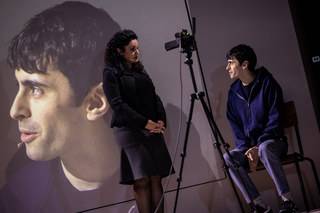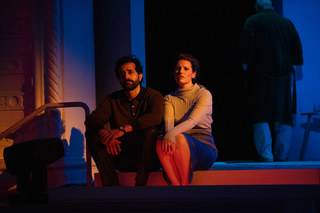|
Back
Enigmas inside People of the Book New York
Sheen Center, Bleeker Street
01/12/2024 - & January, 13, 14, 18, 19, 20, 2024
Mary Kouyoumdjian: Adoration (World Premiere)
Naomi Louisa O’Connell (Rachel), Omar Najimi (Simon), Mark Kudisch (Moris), David Adam Moore (Tom), Miriam Khalil (Sabine), Karim Sulayman (Sami), Sammy Ivany (Young Simon)
Silvana Quartet: Courtney Orlando, Nicole Sharlow (Violins), Gillian Gallagher (Viola), Maria Jeffers (Cello); Alan Pierson (Music Director)
Laine Rettmer (Director); Scott Bolman (Lighting Designer), Rachel Dainer‑Best (Costume Designer), Afsoon Pajoufar (Set Designer), April Goldberg (Cinematographer)

M. Khalil, O. Najimi (© Maria Baranova)
“In time we hate that which we often fear.”
William Shakespeare, Antony and Cleopatra
“The worst sin toward our fellow creatures is not to hate them, but to be indifferent to them: that’s the essence of inhumanity.”
George Bernard Shaw
Mary Kouyoumdjian’s powerful opera Adoration is based on a film made 15 years ago. But its subject–hatred, lies, fantasies, murder in racially divided Israel–could have been torn from any newspaper yesterday, today, or (tragically) in the future.
Then again, that original film was written and directed by Atom Egoyan, a man whose sense of drama and compassion have continued throughout his career. Born in Egypt of Armenian parents, he grew up in Montréal. By origin and upbringing, then, he understands racial tensions and economic tensions. And his documentary on the Armenian deaths and Diaspora from Turkey is one of the great films of 20th Century history.
The same history–that of the problems in Israel–which he takes up with one extended family and one severed community–both dramatically and metaphorically.
The challenge is, though, how does one make a serious opera out of his most complex and most tragic personal and political enigmas?
The challenge was taken up by Royce Vavrek. And he produced a stunning libretto, although not one to comprehend completely at its World Premiere last night. The chronology of Adoration is Joycean or Proustian, going back and forth in time and memory. The idea, of a boy telling a lie so stinging that it becomes a reality, is like a sapient detective story, where both the protagonists and the audience are never certain what is truth or lie., going back and forth in time.
Thus a structure in 90 uninterrupted minutes, set against a clever design of 8‑feet‑high concrete-style blocks turned around, with videos shown both on the stage and outside of the proscenium.
The text itself is almost journalistic, almost commonplace. Yet Mr. Vavrek has his characters repeat their lines–about hatred, falsehoods, racism–over and over again, so the words become ideas in themselves, almost separated from the story.
Or stories.
For the plot revolves around a homework assignment where a boy talks about how his Palestinian father murders his Jewish mother and their unborn child on a plane going to Bethlehem. The horror is so great that the boy lives with its trauma with his uncle, a man who has contempt for Muslims. And with his Jewish grandfather, who despises all gentiles.
Nothing, however, is what it seems. The revelations, coming out slowly, are neither solutions or resolved cadences.
Which brings us to Mary Kouyoumdjian’s music. With her live string quartet, playing against an almost constant electronic drone, Ms. Kouyoumdjian eschews even the idea of anything ethnic. No Arabic, Hebraic or Christian nomes, no quotes, she wisely writes music which serves as background to the all-important verbal ideas.
The voices sing, but the singing is more recitative, rarely going into the nuance of aria. Words are more important here. So the operatic element comes with emphasis, volume, cross‑voices during arguments. The young Simon (Sammy Ifancy) has few words, the older Simon (Omar Najimi) is the official protagonist, yet they are both on stage together.
A blatant yet still fascinating show that guilt never disappears.

K. Sulayman, N. L. O’Connell (© Maria Baranova)
The supposed murder between husband and wife (Naomi Louisa O’Connell and Karim Sulayman) is shattering and gruesome. Yet did it really happen? Ms. O’Connell has little more to say, yet we see her image–her specter?–on the video screen. As much a presence as the young Simon to the older Simon.
Yes, when reference is made to gifted violin playing (the boy? The mother? Both?), we have a lonely solo by violinist Courtney Orlando. And in one of the most dramatic moments ever, a Muslim lady tells of her hatred not of Jews but of Zionists, the music rising with her cries.
(The closest moments to this come with John Adams’ Death of Klinghoffer, but Adams is more subtle, more ironic.)
This is ensemble drama at its best. And political drama which balances on the cusp of Freud, Proust, and today’s violence on the West Bank, in Gaza, throughout the Middle East.
At the end, nobody in the audience will say, “Oh, so that was the explanation”, or “Aha! So we all have to be nice to each other.”
The problems of the drama/opera are far too complicated, too perplexing, too multi-dimensional for that. Like the problems of the Middle East, they are insoluble. The title Adoration is insoluble.
As are the words of the Talmud, the commentaries of the Saints and the Hadith of the Quran. As humans, we know they can’t be solved. As opera‑goers, this opera gives only the Platonic cave as a shadowy answer.
Yet hopefully it is a beginning. Not of wisdom, but of queries, sung and thought.
Harry Rolnick
|